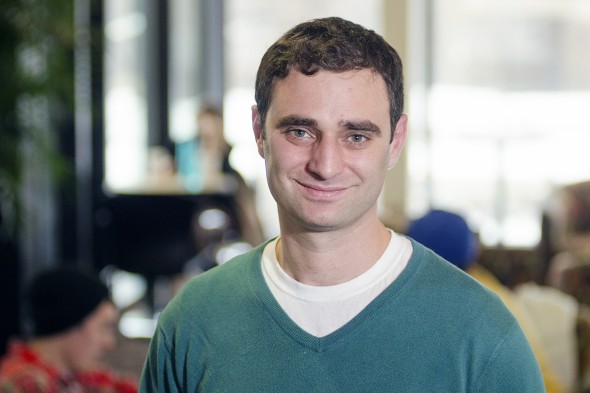Economist learns lessons from Chile’s education system

Benjamin Feigenberg, assistant professor of economics, is an expert on Chile’s voucher system, which determines college choice. — Photo: Joshua Clark
Benjamin Feigenberg has become an expert on Chile’s education system since studying in Santiago 10 years ago, focusing on a voucher system he says is “pretty unique.”
The system applies to 90 to 95 percent of students and effectively determines what college parents can send their children to.
“Any school that charges less than three times the amount of a voucher accepts the government voucher as a portion of the required fee,” said Feigenberg, assistant professor of economics.
“Some schools take the voucher, others take the voucher plus a hundred dollars.”
He’s trying to understand how families are impacted when a school’s costs go up in response to an increase in average regional incomes. In particular, Feigenberg is studying how parental background affects whether families are willing and able to pay higher school prices.
He finds that the students who benefit least from local income increases are those middle-class kids who are priced out of higher-quality schools.
In response to increased incomes, these schools simultaneously increase prices and reduce enrollment. Wealthy parents’ valuation of low enrollment, which leads to smaller class size, helps to explain this phenomenon.
Feigenberg is analyzing data collected from a large-scale experiment in Chile.
A randomized subset of eighth grade students were sent report cards for
secondary schools that provided information on the school’s test scores,
graduation and employment rates, prices and other characteristics.
“I and my co-authors are examining how families’ school choices and students’ academic success were affected by these report cards,” he said.
Feigenberg has traveled to Chile six times and plans another trip this year.
His research makes up one of three chapters in his Ph.D. dissertation. The other two also deal with international issues: microfinance programs in India and the impact of the U.S.-Mexico border fence.
For the former, he’s made a number of trips to West Bengal and Tamil Nadu.
He studied the women there who take out small loans, without collateral, to start or expand small businesses. They sell saris, operate tea stands or run corner stores that offer soap, cell phone minutes, staple foods and other supplies.
Feigenberg examined the social ties formed when women get together frequently with other microloan recipients. He wanted to know whether these social ties reduce social isolation, improve access to informal insurance and reduce loan default.
His subsequent paper on Indian microfinance appeared in the Review of Economic Studies.
Feigenberg’s research on the U.S.-Mexico border fence investigates how much it changed migration patterns.
With the 2006 Secure Fence Act, President George W. Bush and Congress planned to block about one-third of the border, about 700 miles.
“The fence seems effective at stopping people from migrating to the United States from Mexico in areas that have been fenced,” Feigenberg said. “But people are often migrating to save their lives or the lives of their children, and there will always be some alternative way for those most desperate to get in.”
That includes tunneling under, climbing over, coming around via submarine and flying over the 20-foot-high fences on light aircraft, Feigenberg said.
Not to mention just walking across the parts of the border that aren’t fenced.
“There are hundreds of deaths per year,” Feigenberg said. “And the risk of death has doubled since the fence was built.”
The government fenced places that were easiest to cross. “Now you can’t cross in urban areas, but in the desert,” he said.
Feigenberg is looking at what happens to local labor markets when new sections of the barrier go up.
“The fence has potentially hurt businesses that rely on people moving back and forth across the border,” he said. “Many migrants come to the United States and work for a number of months, but then get stuck in this country waiting for their next job because it’s harder to cross.”
Feigenberg grew up in the Boston suburb of Medford. He earned a bachelor’s degree at Brown University in Providence, Rhode Island. He received his Ph.D. from the Massachusetts Institute of Technology in spring 2014 and joined UIC in August.
“I’m big on racquet sports,” he said. Those include tennis and the indoor sport of squash, “which is how I survive the winter.”
A South Loop resident, he’s married to Swapna Reddy. Two summers ago they honeymooned in South Africa, Namibia and Zimbabwe.
And because she’s a law student at Yale, they also put in a considerable amount of travel across the country.
